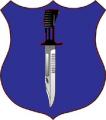Jake Scott, Blood Clot: In Combat with the Patrols Platoon, 3 Para, Afghanistan, 2006
In polar opposition to Beattie is the “raw” account of Jake Scott whose forthright and honest style comes as a cool breeze. At times reminiscent of the early Ernst Jünger Scott’s prose is jagged edged and searing, he pulls no punches which, for a Para, is to be expected. A member of 3 Para’s patrols (reconnaissance) platoon of WMIKs (7) and Pinzgauers (2) he is mostly fond of the former vehicles recounting that ...
The Patrols would do very much of this in their tour in Helmand province although they would also operate on foot during air assaults. He also excels at elucidating the unheralded and often inexplicable aspects of small unit cohesion, camaraderie and brotherhood- the banter, the jibing, driving off whilst the youngest soldier attempts a No.2 behind your WMIK, regimental and professional pride and espirit d’corps- that often determine whether or not men will fight. He’s also not afraid to criticise...I remember talking to a Canadian officer on this while harboured up amongst their convoy for a night in the desert, he too thought we were mad. But as I explained to him and many others who question this, our Land Rovers could get in and out of most areas without being spotted unlike the big US LAVs that were seen miles off. We were small and relatively quiet, light and fast; it provided better cross-country capability and the reason why we would stay off the main routes where others would fall foul and pay the price with roadside bombs. We had better arcs of fire and a 360 view while moving. We could lie low in wadi beds and in mountain gullies. We also had the option of debussing very quickly if need be.(p.34-5)
Like Beattie, Scott also reveals the complexities/pitfalls of CIMIC when he narrates that the Governor of Helmand, Engineer Daoud was pushing for more assistance from UK forces...After the big kick-off about the .50 Cal weapons not firing correctly in Now Zad, little had been done. [...] The Canadians and Estonians were selling the British army .50 Cal ammunition. It was ridiculous that this couldn’t be solved ourselves and we had to sponge off other countries, as whoever had ordered the ammo had, in my opinion, gone for some cheap #### and the low grade of ammo was causing problems[...] What had happened in Now Zad, Sangin, Kajaki and now Musa Qaleh had made the top brass realise that this was no ordinary Iraq, KJosovo or Northern Ireland tour. I also began seeing more kit and equipment coming through the stores, TI was the big thing, TI sights for personal weapons and the .50 Cals were like rocking horse #### yet here they were (one TI per .50 Cal and one Viper TI per team). The new body armour and swing arms for the WMIK along with run-flat tyres we also accommodated. Also more ammo was coming in and we could eventually operate with our ‘full scales’ ammunition [..] About time; but again too little too late in my eyes.(p.135)
Scott vivdly describes the intensity of small unit engagements putting the reader into the heat of battle often in circumstances at once surreal and deadly...One of his former commanders had been attacked and his bodyguards and family members killed. Not only that but one of the local police chiefs was under threat from the local people for raping a young girl. “Let him have it”, we yelled out on hearing the news. I definitely didn’t want to be associated with saving or protecting a rapist and paedophile, I thought we were here to protect the people of Afghanistan and rid them from the Taliban and terror. If they thought we were protecting people like this it would turn everyone against us.(p121-2)
’Stand down lads, its just women and children’, the boss said.
‘Stand down lads just a group pof tarts having a mothers meeting’, I joked.
‘Well is there any chance of getting some scoff?’, Tommo said.
‘Yeah I’m Hank Marvin’, Lee butted in. [...] As the sun began to sink some of women walked past some of the outer positions, no more than 50m away, dressed in their female dish-dash clothing with their faces covered. The Yanks moved a Humvee up onto the high ground alongside our blokes. Chris W., a fuill screw, was the commander up there.
‘Hey what you doing’ he said to one of the Yanks now standing sky lining himself with a tab in his mouth. ‘You’re in plain view, pull your vehicle back’.
‘We are fine mate’, the Yank replied.
OK, suit yourself’, Chris finished. Minutes later as the US soldier sat at the front wheel of his Humvee a massive explosion erupted. The US Humvee exploded into flames, it took a direct hit with an RPG and then everything went noisy around them. Heavy 7.62mm weapons started firing from the location from where the Afghan women had disappeared. Pete McKinley, a tom in A Company, ran forward under fire and dragged the injured Yank back and started first aid while rounds were smacking into the ground in front of him[...] The so-called women had really been Taliban dressed to disguise themselves to get as close as possible to some of the lads and the US troops and set up a firing post right in front of their position.(p.84,85)












Bookmarks